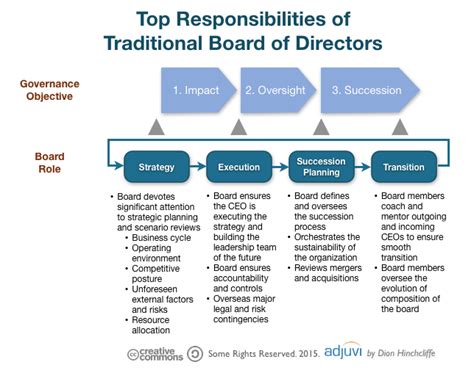Exploring Board Of Directors: Functions, Types, And Roles

When it comes to the governance of an organization or company, the board of directors plays a crucial role. The board of directors is responsible for making important decisions, ensuring compliance with regulations, and providing strategic guidance. In this article, we will explore the functions, types, and roles of the board of directors in detail.
1. Functions of the Board of Directors
The board of directors performs several key functions that are essential for the success and growth of an organization. These functions include:
- Setting the strategic direction: The board of directors is responsible for setting the overall strategic direction of the organization. They define the mission, vision, and goals, and ensure that they align with the organization’s purpose.
- Decision-making: The board of directors makes important decisions on behalf of the organization. They review and approve major initiatives, investments, and policies.
- Monitoring performance: The board of directors monitors the performance of the organization and its management team. They review financial reports, assess risks, and ensure compliance with laws and regulations.
- Providing guidance and support: The board of directors provides guidance and support to the management team. They offer advice, share expertise, and help overcome challenges.
- Appointment and evaluation of executives: The board of directors appoints and evaluates the performance of the executives, including the CEO. They ensure that the organization has capable leadership.
- Accountability to stakeholders: The board of directors is accountable to the stakeholders, including shareholders, employees, customers, and the community. They represent their interests and ensure transparency and ethical behavior.
2. Types of Boards of Directors
There are different types of boards of directors based on the ownership structure and nature of the organization. Some common types include:
- Corporate board: This type of board exists in publicly traded companies. It includes both independent directors and representatives of major shareholders.
- Non-profit board: Non-profit organizations have boards of directors that oversee their operations and ensure compliance with the organization’s mission and values.
- Advisory board: Some organizations have advisory boards that provide guidance and expertise in specific areas, such as technology or finance. Advisory boards are not involved in decision-making.
- Governing board: Educational institutions, hospitals, and government agencies often have governing boards that oversee their operations and ensure compliance with regulations.
- Family board: Family-owned businesses may have a family board to make decisions and ensure harmony among family members involved in the business.
3. Roles of Board Members
Board members have specific roles and responsibilities within the board. These roles include:
- Chairperson: The chairperson leads the board meetings, sets the agenda, and ensures that the board functions effectively.
- CEO: The CEO is typically a board member and serves as the link between the board and the organization’s management team.
- Independent directors: Independent directors are not affiliated with the organization and provide an objective perspective. They bring diverse expertise and experience to the board.
- Committee members: Boards often have committees, such as audit, compensation, and governance committees. Committee members are responsible for specific areas of oversight.
- Non-executive directors: Non-executive directors are not involved in the day-to-day operations of the organization. They provide oversight and guidance.
4. Conclusion
The board of directors plays a critical role in the success of an organization. They provide strategic direction, make important decisions, monitor performance, and ensure accountability. Different types of boards exist based on the ownership structure and nature of the organization. Board members have specific roles and responsibilities within the board. By understanding the functions, types, and roles of the board of directors, organizations can ensure effective governance and achieve their goals.
5. FAQs
Q: What is the purpose of the board of directors?
A: The board of directors provides strategic guidance, makes important decisions, and ensures accountability and compliance within an organization.
Q: How are board members selected?
A: Board members are often selected based on their expertise, experience, and alignment with the organization’s values and goals. They may be nominated by existing board members or shareholders.
Q: What is the difference between an executive and non-executive director?
A: An executive director is involved in the day-to-day operations of the organization, while a non-executive director provides oversight and guidance without being directly involved in operations.
Q: Can board members be held legally responsible for the organization’s actions?
A: Yes, board members have a fiduciary duty to act in the best interests of the organization. They can be held legally responsible for negligence, breaches of duty, or misconduct.
